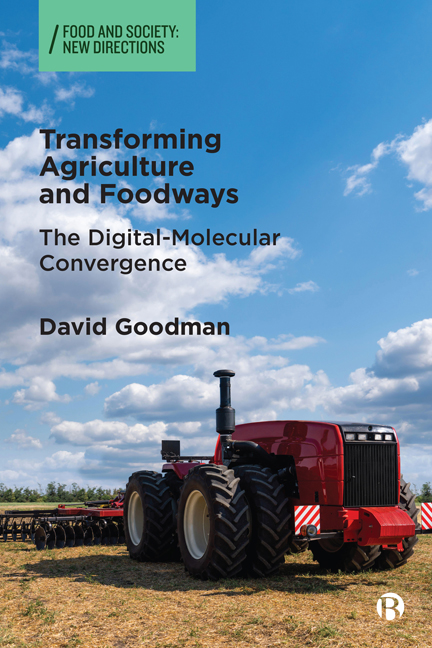Book contents
- Frontmatter
- Dedication
- Contents
- Series Preface
- List of Abbreviations
- Acknowledgements
- 1 Introduction: Technological Convergence and Change in Modern Agro-Food Systems
- 2 Precision Agriculture: Big Data Analytics, Farm Support Platforms, and Concentration in the AgTech Space
- 3 Precision Agriculture: Adoption, ‘Re-Scripting’, Farmer Identity, Path Dependence, and ‘Appropriationism 4.0’
- 4 Alternative Proteins: Bio-Mimicry, Structuring the New Protein Industry, ‘Promissory Narratives’, and ‘Substitutionism 4.0’
- 5 Agri-Biotechnology and the Failed Promises of the Seed-Chemical Complex, CRISPR and Gene Editing, and Regulatory Capture
- 6 Between Physical Space and Digital Space: COVID-19, Platform Capitalism, and Changing Patterns of Food Provisioning
- 7 Conclusion: Continuities in Change and Lost Opportunities
- Postscript
- Notes
- References
- Index
5 - Agri-Biotechnology and the Failed Promises of the Seed-Chemical Complex, CRISPR and Gene Editing, and Regulatory Capture
Published online by Cambridge University Press: 18 January 2024
- Frontmatter
- Dedication
- Contents
- Series Preface
- List of Abbreviations
- Acknowledgements
- 1 Introduction: Technological Convergence and Change in Modern Agro-Food Systems
- 2 Precision Agriculture: Big Data Analytics, Farm Support Platforms, and Concentration in the AgTech Space
- 3 Precision Agriculture: Adoption, ‘Re-Scripting’, Farmer Identity, Path Dependence, and ‘Appropriationism 4.0’
- 4 Alternative Proteins: Bio-Mimicry, Structuring the New Protein Industry, ‘Promissory Narratives’, and ‘Substitutionism 4.0’
- 5 Agri-Biotechnology and the Failed Promises of the Seed-Chemical Complex, CRISPR and Gene Editing, and Regulatory Capture
- 6 Between Physical Space and Digital Space: COVID-19, Platform Capitalism, and Changing Patterns of Food Provisioning
- 7 Conclusion: Continuities in Change and Lost Opportunities
- Postscript
- Notes
- References
- Index
Summary
Introduction
The innovations set in train by the digital-molecular convergence are often lauded as ‘disruptive’ in AgTech Space and elite policy circles, such as the World Economic Forum (WEF). However, as we emphasised in Chapters 2 and 3, inter-capitalist competition in the seed-chemical complex has produced a remarkable degree of corporate continuity, with ‘disruption’ taking the form of successive waves of consolidation that have reduced a diverse sector to a mere handful of mega-firms in 2016– 2018. This is not to under-estimate the rapid innovation in these upstream sectors, nor the inflow of venture capital that has created a fertile ‘eco-system’ of start-ups and research alliances. Nevertheless, as the nascent agri-biotechnology industry demonstrated so clearly in the 1980s and 1990s, the commercial future of these young innovative firms is often precarious, lacking the financial resources needed to scale-up production and expertise in logistics and marketing, making them vulnerable to the M&A strategies of large-scale corporations (see also Kenney, 1998; Howard, 2016).
This chapter draws together several common themes that run through this book. These include the mechanisms of inter-capitalist competition, manifest here in the oligopolistic domination of the global seed-chemical complex by an elite group of ‘legacy’ corporations, the accompanying privatisation of agricultural R&D, and the institutional capture of biotechnology governance, as detailed later. These developments buttress the industrial agro-food system, reproducing its path dependent techno-scientific trajectories and exacerbating the structural crises of rural economy and society analysed by the IATP (2020), John MacDonald and his colleagues (2017, 2018, 2020), Jane Gibson (2019), and Philip Howard (2021).
Here, we again meet the likes of Bayer-Monsanto and the Syngenta Group, with their siren promises for successive generations of plant biotechnologies, locking-in farmers on the treadmill of competitive innovation. Finally, in the form of gene driving, we encounter a Janus-faced technology that offers commercial continuity for plant protection chemicals but also heralds a radical ecological discontinuity. Gene driving transforms the spatiality of molecular intervention from individual plant and animal species to engineering the extinction of insect-vectored plant pests at the level of agro-ecosystems, and beyond.
- Type
- Chapter
- Information
- Transforming Agriculture and FoodwaysThe Digital-Molecular Convergence, pp. 53 - 70Publisher: Bristol University PressPrint publication year: 2023



